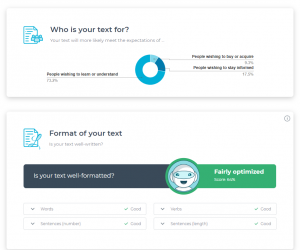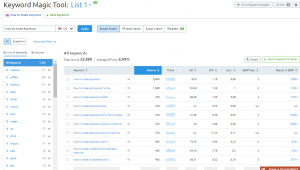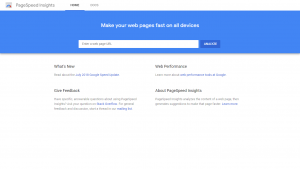Content marketing is a widely recognized and effective strategy for driving traffic to websites and generating leads. That’s why so many online businesses invest tons of money into content production, and the amount of content that gets produced every day is staggering.
While there’s no way to calculate the exact amount, we can get an idea by analyzing some stats. For example, Chris Heald, the Chief architect at Mashable, one of the most visited blogs in the world, answered a Quora question several years ago of how many articles the site produces every day with an astonishing answer:
“The Mashable editorial staff produces around 100 articles/day.”
Let me emphasize: that’s only one site… By the way, thanks to the persistent effort, they’ve reached two million readers in just 18 months.
However, a persistent effort is not the only success ingredient here. Mashable’s content was successful also because it was properly optimized, e.g. it met Google’s requirements in terms of quality, readability, and consistency. The search giant has made it very clear that high-quality, optimized content is the must to entice webmasters to link to a site as well as attract many visitors.
Since Google constantly updates the policies on content optimization, content producers have to follow the recommendations and adjust their websites and content accordingly. Clearly, this is a lot of work, but, fortunately, this is something that technology can help with.
In this article, I’m going to list ten content optimization tools that every content producer and marketer have to know about to be able to maximize the chance of ranking high in Google’s search results.
Read More: Eye Rolls at Pre-Rolls: How to Escape the Trap of Annoying Ads
Really Quick: What is Content Optimization?
“The term “Content Optimization” covers a range of techniques and strategies that seek to make content more actionable, helpful, and attractive to Google and other search engines,” explains Adam Byron, a content marketing specialist from Resumes Centre. “So, despite a popular opinion that content optimization targets readers/viewers, we need to optimize content for search engines to make it easy for them to find and rank it.”
After all, if Google doesn’t find it, people won’t be able to find it, either.
So what you should actually optimize to maximize the reach of your content? There’s plenty of factors here, so let’s move on to the tools that you can use to optimize them all in the right way.
Text Optimizer
Do you want to know how Google perceives your text? If the answer is “no,” then Text Optimizer is the tool to use. Input the URL of your website and get access to the following data:
- To search engines, your text is probably about… This section lists the keywords that play the most important role in defining how Google perceives the essence of your copy
- Who is your text for? This is where the tool lists targeted readers and their principal goals
- Format of your text. In this section, you can get insights into the richness of the text, the use of verbs, the number of sentences, their length, and get an overall formatting score
- Missing words. The tool generates a list of keywords that it thinks you should add to improve its ability to rank.
For example, here’s a part of the report generated by Text Optimizer.
 Thanks to the tool, you can get evidence-based information on how to expand your text, what keywords to use, and how to create more in-depth content, which Google loves.
Thanks to the tool, you can get evidence-based information on how to expand your text, what keywords to use, and how to create more in-depth content, which Google loves.
SEMRush
If you need a reliable tool to research keywords and explore strategies of competitors, I suggest you use this one. Just type your domain and you’ll get tons of helpful data related to SEO (also I suggest you register to expand the number of free requests to ten, it’s quick and certainly worth it).
After you press “Start Now,” you’ll arrive at the dashboard packed with data (basically there are seven tabs to choose from: Overview, Organic Search, Backlinks, Advertising Research, PLA Research, Display Advertising, and Traffic Analysis). Here’s what you’ll find in the Overview section:
- Organic search data
- Paid search data
- Top Backlinks
- Display advertising
- Organic keywords
- Organic position distribution
- Main organic competitors
- Competitive positioning map
- Top anchors
- Many more.
Read More: 3 Ways Mobile Technology is Changing the Brick-and-Mortar Experience
On top of that, you can also get access to useful keyword analytics; besides the general keyword analysis, check out SEMrush Magic Tool, too. It’s free to use and can generate the following useful insights: related long-tail keywords, volume, trends, results in SERP, and more.
For example, here’s the report on a keyword phrase “how to make espresso.”

So if you need to do some serious keyword research to optimize your content, this is the tool to use. Remember that you can get 10 free requests per day, which is great if you’re on a budget for marketing research.
PageSpeed Insights
This one from Google is an absolute must-have because it evaluates the content on your page and makes suggestions on how to optimize it to make it load faster. Since 53 percent of mobile site users leave a page if it takes more than three seconds to load, optimizing for speed is simply essential.
Yes, it seems that an easy way to increase your website’s ability to convert and load faster has nothing to do with colorful CTAs or fancy keywords.
 Entering the location of your website and hitting the “Analyze” button will trigger the generation of a personalized report on factors that slow down your pages, along with the recommendations on how to address them properly. Read those recommendations carefully and review them to understand how to apply them.
Entering the location of your website and hitting the “Analyze” button will trigger the generation of a personalized report on factors that slow down your pages, along with the recommendations on how to address them properly. Read those recommendations carefully and review them to understand how to apply them.
Also, you’ll get the PageSpeed score. It ranges from 0 to 100 points. “If the score is higher than 85, it means that a website is well-optimized,” says Kristin Lott, an SEO specialist at Essaysupply.com and Resumes Expert. “On the other hand, a score lower than that requires you to do some optimization work.”
Don’t forget that you can also test your website for mobile-friendliness here, too. Since Google’s algorithms prioritize responsive websites, this factor is critical for proper SEO.
General Writing Tools
In this section, let’s review some of the tools that you can use to optimize your written content to ensure high readability, proper style, and lack of embarrassing grammar and spelling mistakes.
- Plagiarism Checker from SeoToolStation. Plagiarism is an unacceptable practice that won’t be tolerated by both Google and your readers. Use an URL address or just paste the text you would like to check in the tool to get a report on the originality.
- Canada Writers. According to Google’s John Muller, terrible English will cause visitors to lose trust in a website, which is something to be avoided. Canada Writers is a review website that can help you to check your grammar and get personalized assistance on content creation to ensure the highest quality of your texts.
- Hemingway Editor. Internet users prefer articles that are easy to read and understand to get the most useful information as fast as possible. That’s exactly what Hemingway Editor can help you with, as it checks your text for complicated sentences, passive voice overuse, and makes style suggestions.
- Get Good Grade. If you need a personalized report on your written content from a professional SEO writer, then check out this tool. They do academic, marketing, and common writing reports as well as keyword analysis to help get to the top of search engine results.
- Keyword Density Checker. Gone are the days when you could stuff your texts with a lot of keywords and get ranked. To make sure that the keyword density of your written content is appropriate, give this free tool a try. Just paste a text or provide a URL and get a report within seconds.
- com. When you’re ready to edit your content or improve it by adding more, use this tool to get professional assistance. Get such useful information as overused words, complex sentences, plagiarism, inappropriate word choice, style inconsistency and so on.
- Title tag Optimizer. Title tags are important because they tell Google users what the page is all about. They appear as a link text in search results as well as at the top of the browser when the page is viewed; this tool can you with optimizing title tags (and meta descriptions, too!) in terms of length, keywords, and reader value.
- Portent’s Content Idea Generator. This one is a cakewalk to use and can help to write keyword-optimized blog topics. Just insert a keyword or keyword combinations, and the tool generates numerous options for topics as well as their explanations to inspire you to make them even better. The tool also generates basic headline writing tips, which is also helpful.
Over to You
Seems like the content competition is not going anywhere anytime soon, so optimization is something that should be on the content producers’ and marketers’ priority list. This process is much more pleasurable and effective when you use tools like the ones I described here, so hopefully, you’ll give at least some of them a try to make your content more Google-friendly as well as more valuable to the readers.
Read More: How AI will Change the Game for Influencer Marketing
